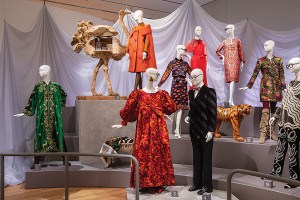Harvard Humanist Chaplain Talks About His Role on Married At First Sight

Photo Courtesy of FYI’s ‘Married at First Sight’
Harvard Humanist Chaplain Greg Epstein believes that healthy relationships can form in many different ways, even if it means pairing two complete strangers and throwing them into the gauntlet of marriage to try and figure out a life together.
“There isn’t really one perfect person for each of us. It’s more like we have the opportunity to make ourselves into a person who could be in a great relationship,” Epstein said.
Epstein’s position on how relationships work is why he was hand-picked as one of four specialists for a new reality TV show called Married At First Sight, where the experts match people up to partake in an impromptu marriage. As part of the deal on the show, the couple doesn’t get to meet until they arrive at the alter, throwing a wrench into the works and calling into question the basic rules of attraction.
The “extreme social experiment” is based off of a hit Danish television show that tests the limits of how people traditionally come together, to see if love can be learned, and if feelings can transcend the surface level attractions that often serve as the foundation for long-term commitments.
The show, which follows three couples from their wedding day to their nesting phase, and makes them decide after six months if they will stay together or get divorced, has been called out by devout religious leaders for tainting the sanctity of marriage.
But Epstein disagrees with that sentiment, and believes it’s not just the couples featured on the series that stand to learn something about how relationships work—he believes anyone who watches the series on A&E’s FYI channel will walk away with a little more insight into how we define love and marriage.
With the show wrapped up and now airing weekly, Boston talked with Epstein about his role on the series, and what he absorbed as a specialist participating in the experiment.
Is this the first time you’ve done anything like this?
In the sense that this is a reality TV show, yes. I have been on TV being interviewed about humanism many times, but this is a departure for me in the sense that it’s very different from what I have publicly commented on in the past.
How did they approach you?
The idea is, this show is being done in about 15 or so countries around the world this year. The Danish original version of the show has a requirement that all of the other shows around the world will adopt this basic format, and that there be some sort of a religious advisor. In the Danish version they have a priest because there is the Church of Denmark. So that was fairly obvious. But in a country like America, where you have such religious diversity and no established religion, it was unclear what religious person or perspective they should use for a program like this.
And so that’s where you came in. What’s it like to play a matchmaker?
It’s been really interesting. I don’t consider myself to be a matchmaking advocate. I think most couples should find themselves, but I think that it has given me a chance to advocate for something I care about very deeply, which is thoughtful relationships, and using all available data and our reasoning abilities, and our intelligence as well as our hearts to find the best possible relationships.
On the show, you guys say there’s some science behind these pairings. But one girl seems not very pleased when she meets her match.
Obviously I can’t reveal what happens later in the show, but beyond that, I do think that it’s important to remind myself and others that we weren’t promising perfection, and we weren’t promising everything would work out in the end like a big fairytale. It’s fairytales precisely that prevent us from having many of the healthy relationships that we could have. In this case, we went into it knowing we didn’t have a 100 percent chance that people would find each other initially perfect, or initially attractive. But, at the same time, one of the things that always come up for me—let’s say we pick partners they will be perfectly attracted to, that person is going to completely change. Their appearance is going to change over the course of their lifetime, and when you talk about marriage, you talk about a lifetime. So the kinds of things that we picked our partners on are not often the right criteria for a long-term commitment. And the question is, do these couples have something to learn from that?
Do you think there is a good chance they will learn something?
I do. I think that human beings—all good psychological literature to me indicates that human beings are capable of learning and maturing into better people, and are capable of learning how to care more about other people and the world around us than we do about ourselves. And that’s maybe the biggest lesson for a lifelong relationship. Maybe what we really need to feel OK is not the biggest external thing that will impress everyone else, but maybe it’s the sense of loving and caring about the world more than we care about ourselves.
What was your experience being part of this show?
I had a very positive experience with it all. I can’t say what does and what doesn’t work out with the relationships, but I can say that I am satisfied that the experience has overall been a positive one with the individuals involved. These six individuals involved, we took care to look after them, and to make sure that they were in a good place. If you look at the young women, they did the Today show [recently], and they all went on together and talked about what the experience was like for them. To me they each came off as poised and very healthy and charming individuals who did this out of a sense of adventure and a desire to learn something about themselves. I feel good about it from my perspective because of that. But I also really think viewers can and will learn something about themselves.
Do you think viewers will be surprised by some of the outcomes, too?
I do. Because it’s shocking when you think that love could develop from this type of bizarre situation—but aren’t most of the relationships we have caused by bizarre situations? When my wife and I are hanging out with other young couples, one of the biggest things we tend to talk about is ‘how did you guys meet?’ And I think the reason we talk about that is because we are all fascinated to know that, of all these millions and billions of people walking around on the surface of this planet, we are at least eventually going to find probably one other person that could be a good match for us, and it’s bizarre to think that we interact with thousands of people every week, and only one of them is the person that we want to build a relationship with. It’s bizarre. I think this [show] is really playing on that and causing us to think more carefully about the idea that there is one perfect person out there.
Since this goes outside of how things are normally done, have you received any backlash about this ruining the “sanctity of marriage”?
A lot of the “ruining the concept of marriage” stuff that I have seen comes either from very conservative people, or people who haven’t seen the show. Or both. In Denmark, this show when it first came out caused a huge controversy, mainly generated by conservative Christian clergy. Those people generated a lot of controversy and talk about how controversial this show was, because they were saying basically there is one right way to get married. But the show is against that idea. The show says, ‘No, there is not one right way to get married, marriage is hard, and it affects every single one of us differently.’ But, you will see that every single person involved, from me, to the co-panelists, to the producers, to the editors—every single one of us believes that marriage is incredibly important. And every single one of us wants this show to strengthen the concept of marriage, not to weaken it.
Are there going to be more seasons?
I hope so. I think what I have heard from the initial reports is that the ratings have been very good. So I would hope so. But time will tell.
Would you be interested in being involved going forward?
At this point I would. Again, my goal for doing this was to be able to explore in popular culture the issue of healthy relationships and what they really look like, and what they are supposed to look like, and so far I think that goal has been achieved. I have a humanistic perspective on what healthy relationships can be, and I was interested in discussing that perspective in popular culture and the mass media, and I think so far I have had that opportunity, so I’m grateful for that and interested to see where it goes from here.

